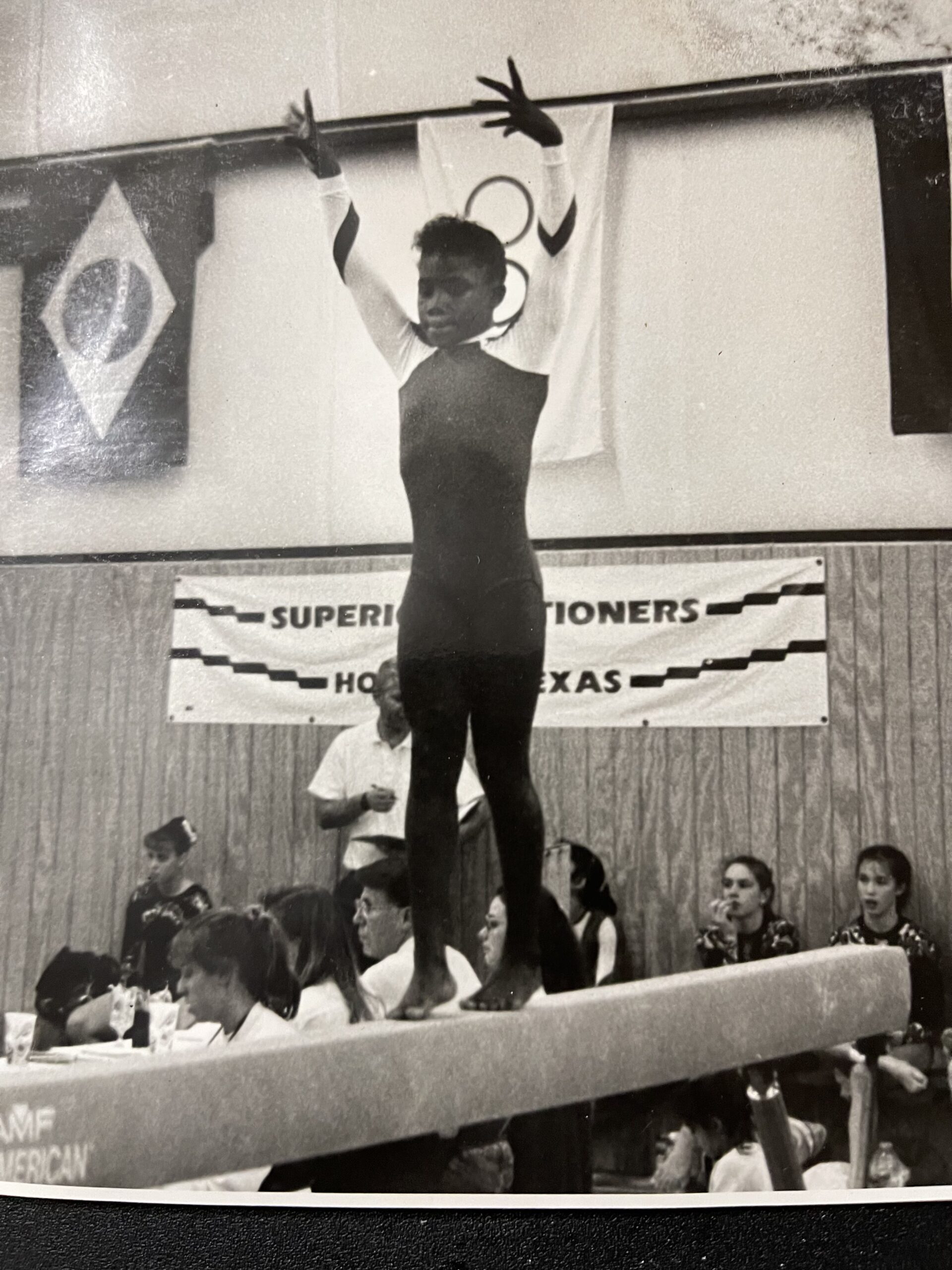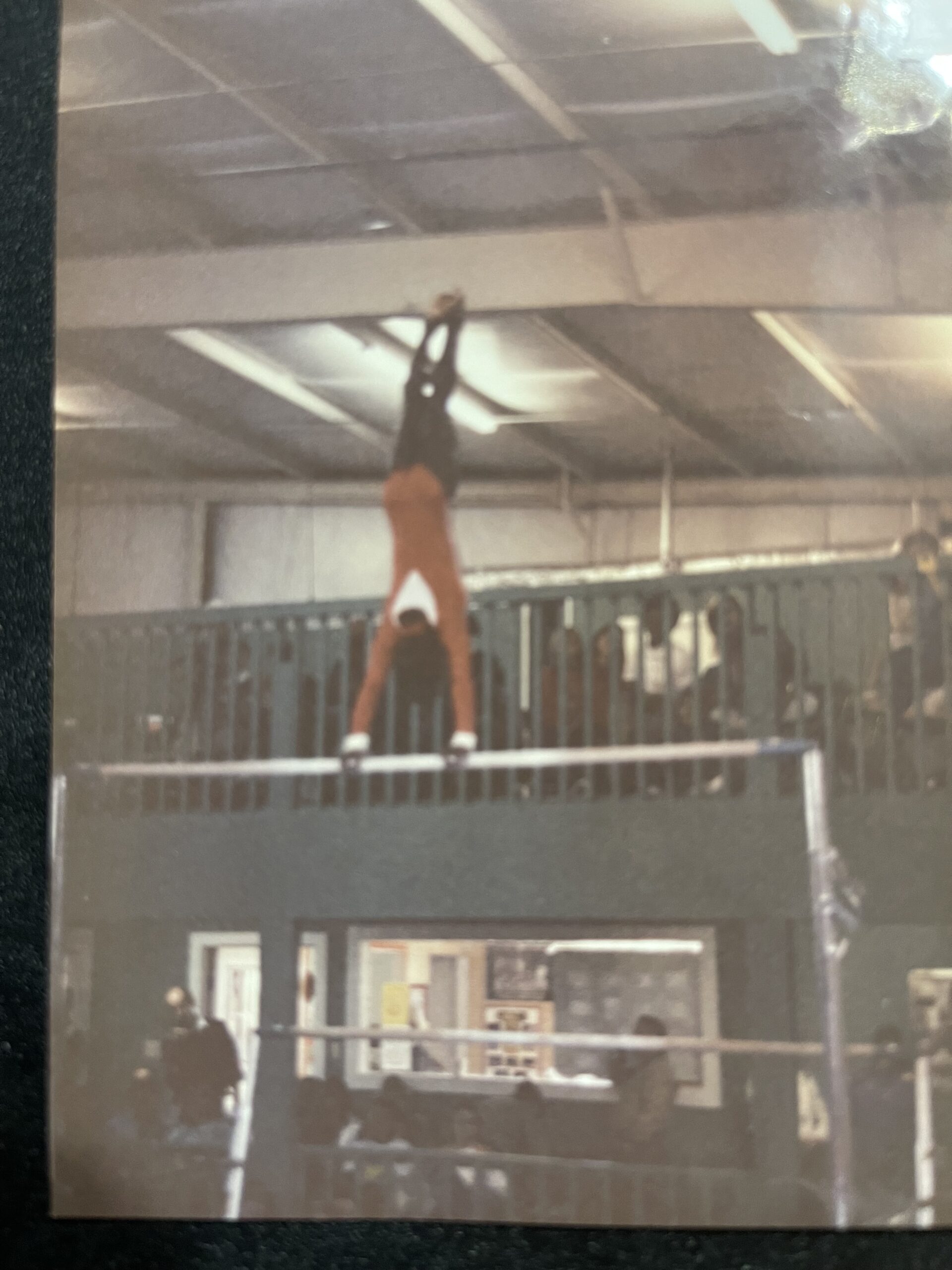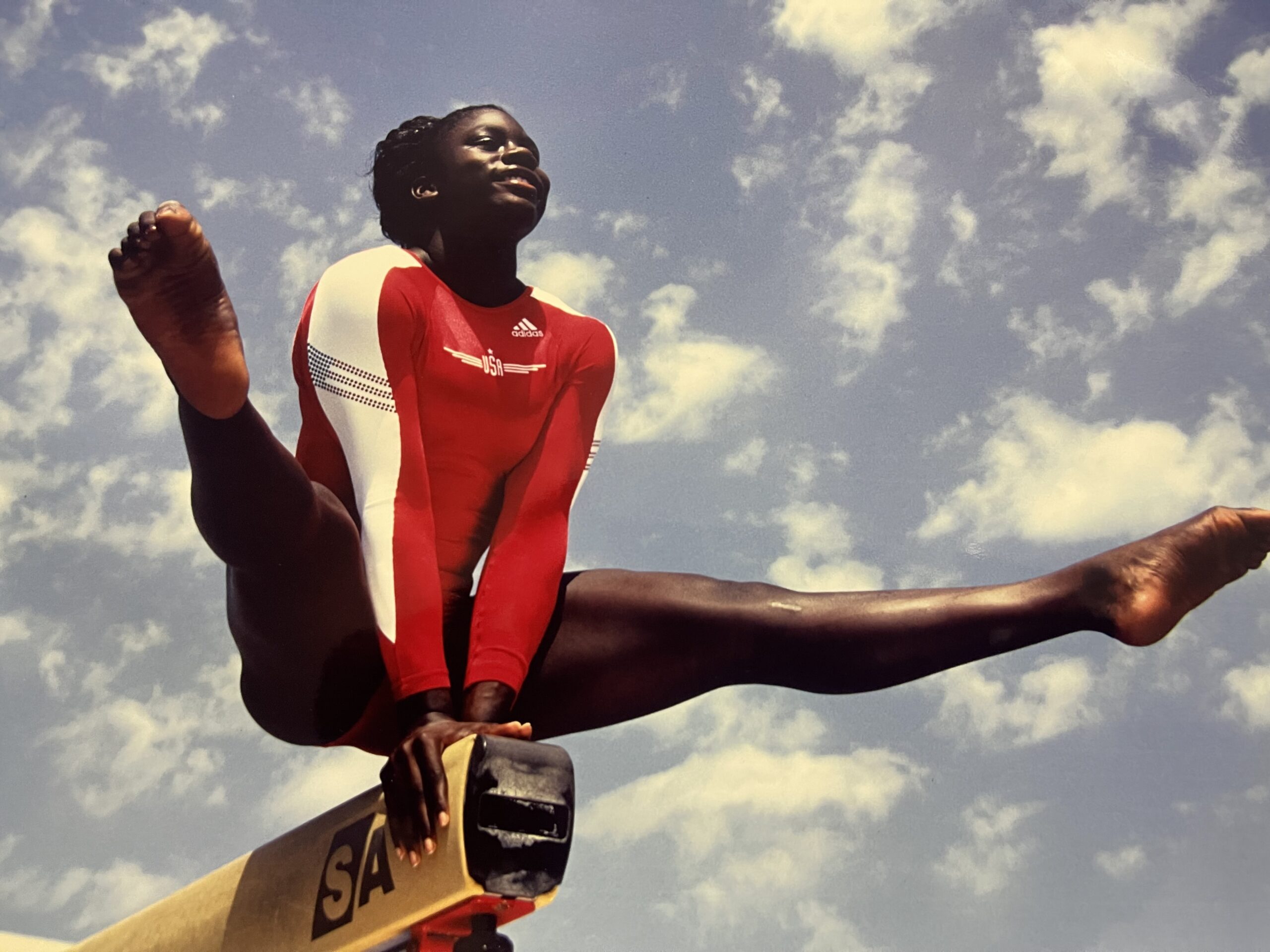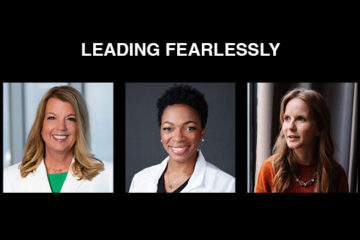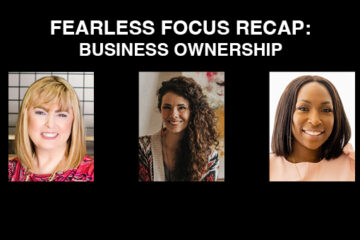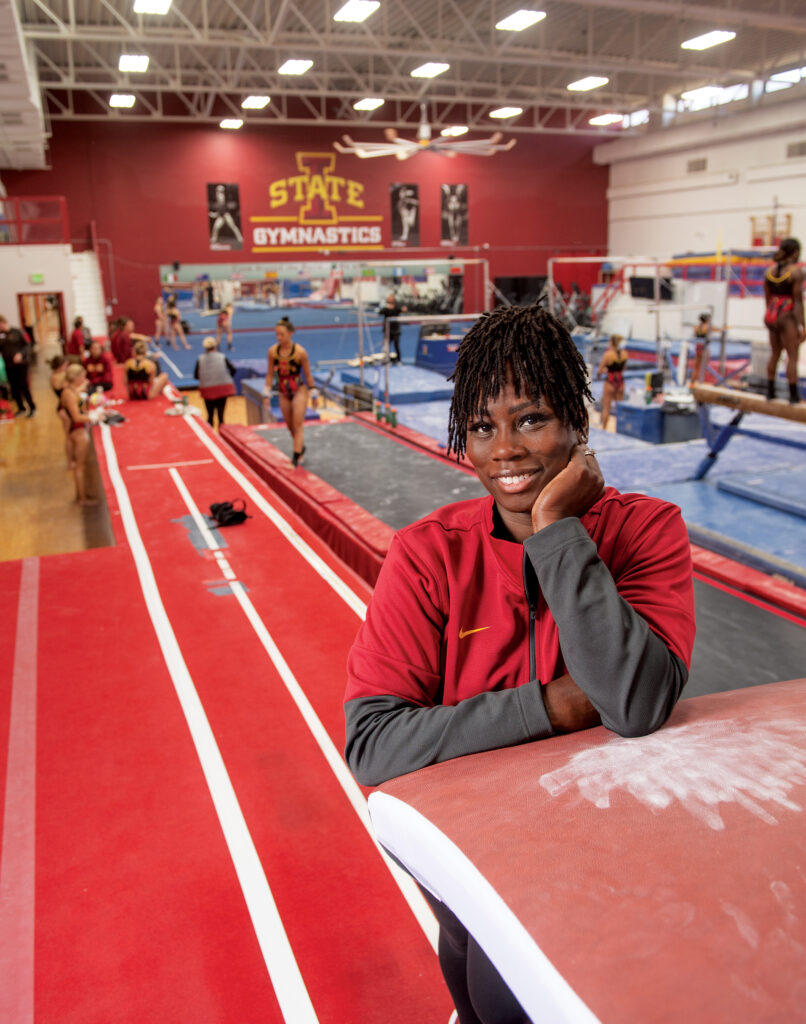
As told to Nicole Grundmeier
Ashley Miles Greig just went through an extraordinary career change. Miles Greig, 38, spent most of her career in auto finance – working at dealerships, and then beginning in 2013 with JPMorgan Chase & Co. She and her husband, Orestes Greig, wanted to start a family. They underwent treatments for infertility, which Miles Greig has talked about publicly. The treatments did not result in a successful pregnancy. She ultimately decided to expand her family by accepting the head coaching position for ISU women’s gymnastics in 2023. She had never coached gymnastics. But she had a long and wildly successful career as an elite gymnast and then as a collegiate gymnast at the University of Alabama. Miles Greig grew up in San Antonio, Texas. She was considered a tall gymnast, around 5 feet, 7 inches, as a senior elite. In 2001, Miles Greig competed at the World Artistic Gymnastics Championships in Ghent, Belgium. She was essential in securing a bronze medal for Team USA during a stretch of time when the U.S. did not medal consistently in international competitions. Miles Greig also made the vault final – she was one of the top eight women vaulters in the world in 2001. She and her husband live in Ames.
The following story has been formatted to be entirely in her words, and has been edited and condensed for clarity.
I was 6 years old [when I started gymnastics], which is actually a little bit older than you hear from a lot of athletes. They’re like, “I started when I was 2 and did the mommy-and-me classes.” But for me, I saw a rerun of the 1984 Olympics. Mary Lou Retton, right? Where she scores the perfect 10? I started jumping, running, flipping off things, probably scaring the crap out of my mom. When we moved to Texas, I begged for them to put me in gymnastics. I finally got my way, and the rest is kind of history. Showed up, never looked back.
From the day I showed up at the gym when my mom took me – the owner of the gym, he was eventually my first coach, all my foundational skills came from him – Michael Harris at HUGS, Harris Unlimited Gymnastics School. He approached my mom and said, “Your daughter looks like she has a natural talent for this. Would you be interested in signing her up for team? Not just recreational. She’d come X amount of days a week.” And then of course, it got to the financial part of that, and the answer was, “Absolutely not. No, we’re not doing that.”
The next time I went, my dad took me, and we came home – “Oh, she’s going to be on team, and she’s going to do this and that.” So Mike got his way.
Seeing the other team girls that were of competition level doing all the fun skills on all the different events … I wanted to do it all. I want to be over there with them. And it didn’t take me long to get there. I was fearless.
You look at gymnastics and you see the equipment, the skills. I think one of the favorite sayings of some coaches growing up, especially for the balance beam: I love the beam, because if you don’t do what you’re supposed to do, I don’t have to do a thing: the equipment’s gonna punish you. You’re gonna fail, you’re gonna split the beam, you’re gonna fall off. It helps you be more intentional about the decisions that you’re making. That actually is the word of the week for the first week of official practice for gymnastics here, is “intentional.”
I saw those big girls doing the big skills and trying new things, and I wanted to be them. I wanted to be in that group. I would do just about anything to get there. I remember as I progressed through my training, I was homeschooled, I practiced two times a day. There was a group of us, maybe six or seven, altogether that we homeschooled. It’s all we did. We did gym, we went to school, we did gym again, we conditioned, we did ballet. It was a competitive environment to develop and grow up in, which I think helped all of us kind of elevate. Everything was a competition.
Starting off, I was the same as everybody else. I was this little teeny-tiny thing. And then puberty hits, and I just shot up.
I got used to, in my lifetime, being “the only.” That’s a thing you just learn as a young kid, how to operate as being the only Black girl just about everywhere you go. Gymnastics, historically, is a very white sport. It’s subjective, too. So throw that into the mix and, wow, that’s breeding grounds for potentially lots of insecurities.
I always say that my foundation, my family, was so positive and so reinforcing: “You’re beautiful. You are who you are. Be comfortable and confident in who you are. You’ve got to work hard.”
That’s a real thing for Black kids growing up: You’ve got to be twice as good as everybody else. I felt that. I did. I had to fight extra hard to get everything I got because I wasn’t the typical. I’m not going to say names, but teeny-tiny athletes that you think of when you think gymnasts: It’s not me.
Even now, I think with my height, it could be recruits, or, even when I got here, the assistant coach Haylee Young, she just looks at me one day and she goes, “Was this your competition height?” Because they’re just floored, and I’m like, “Yeah, this is how tall I was when I was competing. Yeah, this was me.”
When I look at the elite gymnastics world now, I see the diversity. I mean, we could potentially have a United States Olympic team that’s all Black. Legitimately. They all deserve to be there. They are good. They are representing the sport. So we’ve come such a long way, I think, in that space.
——————
(Reporter’s note: Miles Greig was a member of the U.S. national team in the late 1990s and early 2000s, which was a period of transition for elite women’s gymnastics. USA Gymnastics asked Bela Karolyi, and then Marta Karolyi, to create a semi-centralized system of training that required national team members to attend monthly camps at the Karolyi Ranch outside of Huntsville, Texas.)
When you say climate and then you say Bela and Marta (Karolyi), I think Karolyi Ranch; Houston, Texas; hot. It was very hot at those camps out there. I had interactions with both of them.
[Host of the influential gymnastics podcast GymCastic] Jessica O’Beirne, when I talked to her, she had this perception that Marta always loved me, and that we had this great relationship. But I always felt as far as national team things go, I always stand by feeling like I was just tolerated.
I was good at vault. I was good at floor. I was pretty good at bars – I mean, I was one of only two athletes that competed in three events in the team final at the world championships. But my experiences were, it was a tough environment. You’re in a pressure cooker. You feel like you’re under a microscope. They’re watching every single thing you do. And for me, it was that feeling of you’ve got to be better than everybody else to even get a fair shake. And I did that. I worked extra hard to get the opportunities that I got, and I’m proud of that.
I would say that, as an athlete, I was one of the lucky ones who was very protected, by my coach, and also my parents. They kept me from a lot of negativity surrounding me in the sport. There’s some nasty people out there that say some pretty ugly things, and for a child, it wouldn’t be very conducive or helpful to hear. So I’m thankful for that as an adult.
[USA Gymnastics] is definitely doing a lot better now than they have been. I think anybody can agree with that. But I also think that there’s much more to be done. It’s sad when you think back to the stories that are out there, that you hear, and it’s unfortunate. It was just wrong, that it was allowed to get to the point where it got. But I think moving forward, as an organization, they just need to do more. Essentially, those lines of communication need to be open. These athletes need to be heard. They need to be able to tell their stories, and we need to do everything we can in our power to keep them safe. Because that’s what it’s all about. Not winning medals. That’s a byproduct of everything else that goes into it.
——————
I ended up, oddly enough, in the car business right out of college, when I graduated from Alabama. It was my first really important insight into the business world and how it works through connection. Everything is all about who you know. I got my job through a connection at Alabama, the head coach there, Sarah Patterson.
The owner of the dealership where I worked was a big sponsor for the University of Alabama gymnastics program. They did demos for a lot of the head coaches. They supported the annual “pink meet” every single year.
He literally was just asking Sarah, “Hey, what’s Ashley Miles doing now that she’s graduated?” He was like, “She looking for a job?” And he was like, “Send her over to me. I might have something in mind for her.”
I didn’t have a resume, didn’t have anything together. Just went to have a conversation, and I left with a job. I think that’s one of the benefits of being a student-athlete. I think corporate America and businesses see the value and the experience – even though they might not have that work experience, they have the goal-setting, the communication, the pursuing something in spades. So they can pretty much be guided and taught to do anything, and generally, they’re going to be pretty successful at it.
Initially, I was supposed to be a manager of a brand within Toyota. It was the Scion brand. I was going to go through training, learn how to sell cars, but also do the front and the back. I would be doing the selling, also the financing part, for that brand. As it grew, the plan was to add more and more and more. Well, somehow along that line, when I was going through that training process, somebody in the finance department quit.
Then it was another, “Hey, Ashley, why don’t you just go sit in there with the finance director and see what you can pick up, see what you can learn?” I just took it in. Probably 90 days later, I’m a full-fledged finance manager, not realizing that at the time, 21, 22 years old, that that’s not normal, to go into a dealership and you’re a finance manager, telling people that have been doing this for 15, 20 years to “Go get your stuff and your deal, get everything together.” “I need you to do your job so I can do my job.” I was totally oblivious to the fact that they’re probably looking at me like, “Who does this little girl think she is?”
But again, I’m process-oriented. If you teach me how to do something, I will follow instructions. I’m very much a rule-follower, just in life, and I think most gymnasts are. I took it in and evolved and learned the craft, really got trained very well in selling. That’s a big part of what I’m doing here as a head coach.
There are a couple of additional foundational items that you have to have to be successful, because, really, what I’m doing every day is selling my program. Selling Iowa State to recruits, getting the buy-in from these athletes to get on the same page. Everything is kind of connected, and it transfers.
Once I left being in a dealership, I took about a year and a half off. I did some independent contracting where I would fill in at dealerships if they had a finance manager that’s out on vacation. I would go into the dealership and work so they had coverage but also do an overview of things that I saw and ways that they can improve training.
I did that for a bit and then ended up getting hired on at JPMorgan Chase as a dealership relationship manager, so I had a territory of retailers throughout the Southeast that I was responsible for.
Every single job that I’ve had in my life is one that I technically wasn’t qualified for. Like, “We normally don’t hire people that don’t have outside sales experience, but we see something in you, so, we’re going to give you an opportunity.” I just thrive in those types of situations.
——————
(Reporter’s note: Miles Greig has been a gymnastics commentator, working as an analyst for the ESPN family of networks. She served as a member of the ESPN/ABC broadcast crew for the 2023 NCAA Women’s Gymnastics Championships. She has also worked as a choreographer.)
With broadcasting, of course, I know gymnastics. I’ve been around it. I’ve competed in it. I’ve had a college career. I was an elite. Never coached, but to me – I can make corrections, right? I can look at a skill and communicate what I see that needs to be done. That’s not where I’m strong, but that’s definitely a role I can grow into.
But I think it’s all of the other pieces where I can thrive here at Iowa State, and I think that’s what they saw. They needed a change in leadership and new energy, a CEO of the program.
I didn’t get here on my own, either – don’t get it twisted, I did have help. I had some very heavy hitters and big names helping me along and talking me up and making that recommendation: “Why don’t you talk to Ashley Miles Grieg?” Sarah Patterson, obviously, very supportive. Miss Val, Valorie Kondos Field, she is my superstar. She’s my hero. Love that woman.
Things that happened in my personal life catapulted me to making this big leap of faith, or this big transition, and giving up a very solid, financially sound career where I have flexibility, I can kind of do what I want.
The big thing was, my husband, Orestes, and I wanted to have kids and grow our family. We got married in 2014, and shortly after that decided that this is what we want to do. We were back and forth between whether we wanted to do that or not. We decided yes, full steam ahead.
Needless to say, five years later, however many years later, it just didn’t happen. I went through IVF, went through all the things, had the transfers, three different cycles of it, and it just never resulted in a successful pregnancy.
But my life foundation at that time was set up to be conducive to grow our family and be a mom to raise my kids, as well as have flexibility, a good-paying job. So, was I passionate about what I was doing? Not really. I wasn’t passionate about the car business but I am passionate about people. I love the connections I made, the relationships I built in that business, with the clients that I had.
I finally had that moment where I realized, “OK, this might not happen for us. What am I doing? Am I going to continue down this path of having this job that I really don’t care for too much? Or do I need to figure out, if I’m not going to have kids and that’s not going to be my contribution to this world, having little mini-me(s) running around” – Who knows what will happen? You never know, right? It’s in God’s hands, at this point – I said, “What am I passionate about?”
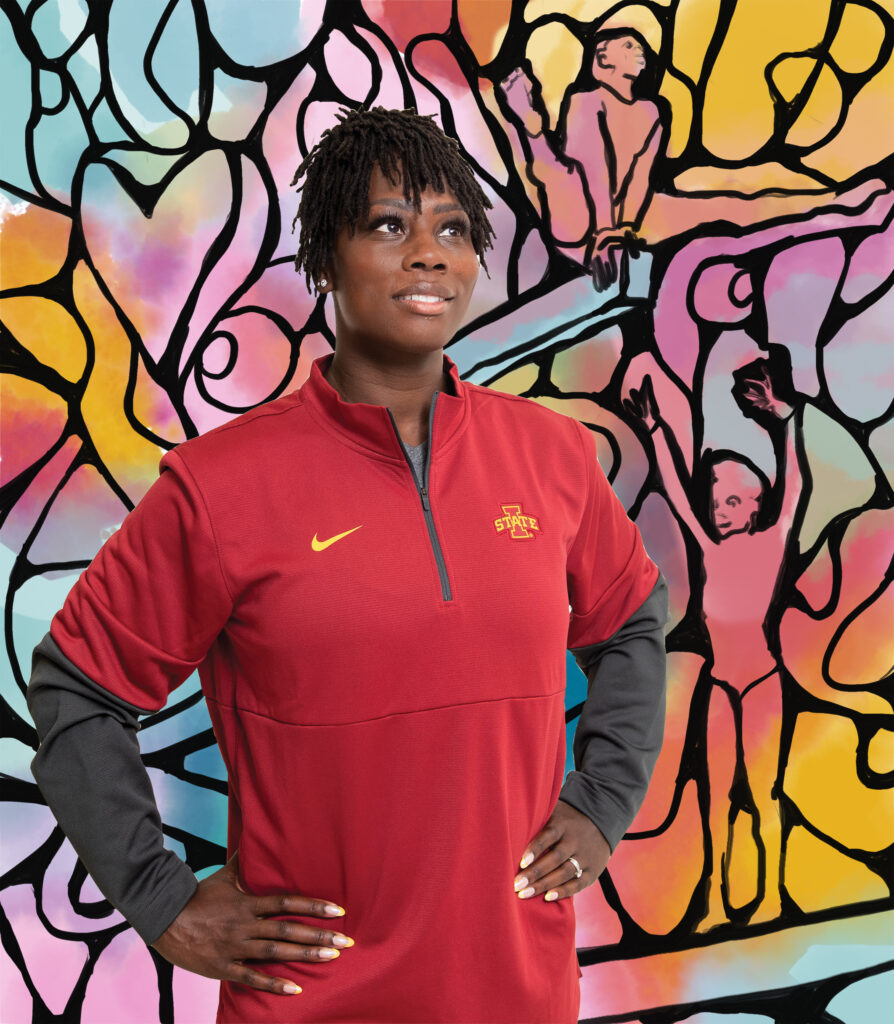
It’s always gymnastics. It’s always been there – choreography, the commentating, staying close to the sport, knowing what’s going on. That’s when I decided, “Hey, I’m going to pursue this, I’m going to put it out there that I want to do this and see what happens.”
It took a few years for this opportunity to come up, but when it did, I was ready and it was a good fit. My initial thoughts about coming to Iowa was what I think a lot of people would think: “What the hell is in Iowa? Central Iowa, what do I know? Corn, right?” But then you get here, and you’re pleasantly surprised. Especially Ames, it’s a college town, it’s great people. I was floored.
I know what a good college environment, a good college town, looks like and feels like – I mean, I went to school in Alabama. Tuscaloosa, hello. They’ve got that and more here. Same type of energy. There’s no professional teams around, so lots of support for the Cyclones. Cyclone Nation is strong. It’s been a wonderful onboarding process and transition to being here.
I’m so blessed to just be doing this, to have this opportunity to influence young women, to grow young women, and to teach them what I know. We had a recruit here on campus this past weekend, and she asked me, “Do you have kids?” And I said, “No, but yeah, kind of, I have 21.” So I would never say this to them, because that’s too much pressure to put on kids, but they’re my babies. That’s how I look at them. That’s my contribution.
——————
We had our family weekend here recently over Labor Day, the first football game where we invite our families to come spend time with the coaching staff, with their children, their daughters and go to a football game. We do a dinner, and it’s really fun.
One of the moms of one of the athletes, maybe she heard the same conversation I had [with Jessica O’Beirne, where she mentioned infertility] and she just was like, “Look, if you ever need to talk about it, same situation. They told me I would never have kids, and I have four.” One of them is here and she’s on the team. She was a preemie; she just told me her whole story.
For me, it’s helpful to talk about it. I’d rather not be a part of keeping that stigma alive. Because when you do say something, there’s not very many degrees of separation between people that have experienced this, or know someone that has, and I think it’s just helpful. We should just normalize: It’s not easy to get pregnant for everybody. And it sucks. And it’s OK to talk about it. It’s OK to be sad. You can be mad that somebody else is having that joy and elated for them at the same time.
——————
The top priority for me is that young student-athletes and prospects have a passion for the sport of gymnastics still. They could be the best, most talented athlete, but as a coach and as somebody that’s been through it, I know that once you get here, it doesn’t get easier. Because you have all those other components that go with it. So, transitioning to making your own decisions, academics. What you want to do, what type of work, all the things that come along with it, that you have to focus on.
If you are still struggling with whether or not you love the sport, that’s not a really good starting point or a recipe that’s going to turn out tasting good at all. I would say somebody that has a true passion and a desire in love for gymnastics still is an ideal recruit. It could be tough, where they’re at now, but it’s still there.
I love the athletes and prospects that are confident and really comfortable articulating what it is they want. I’ll talk to them: “What do you think your contribution to the Iowa State gymnastics team would be?” That might be a question I ask. And I get the, “Oh, I just want to go, I want to be a good teammate. And I want to support everybody.” I’m like, “That’s good. But what do you want? What do you want to do specifically? Do you want to compete bars? Do you want to do all-around? Do you want to anchor floor? Do you think that your bars is so good that every single time you go, you’re going to be in that last spot and be able to score 9.9?”

Those are the types of athletes that I love. Also, good character is a must. I’m willing to meet these athletes where they are, because of course, they’re coming from different coaching styles, different cultures, lots of different backgrounds. You think about young women who have been kind of in a box, gymnastics, their entire life, and then they come to an environment where they have all this freedom, and they’re shoved in this group with other people who don’t look like them, who think differently, who were coached differently. That can be a disaster.
But I think if you get those kids that have the character, have the desire, and have at least a base level of communication that is good, you can guide them, and most of the time, they’re going to be receptive and buy into what we have going on here at Iowa State.
I cannot wait for that first home meet. In a perfect world, we’re prepared, we’re ready, we’re locked in, and we can go out there and perform and have fun as a team. I want these athletes to have the best possible experience here at Iowa State as possible. That really is what it’s all about. Because otherwise, why are we here? We’re going to work hard, but we’re going to have fun while we do it.
I hope that Iowa State athletes leave here with the skills necessary to be successful in life. I hope they leave here knowing who they are. Of course, we go through stages in life where we figure that out. This is the most important time in their lives.
This is the only time in your life that you will have where you can literally be selfish. It’s all about you: What do I want to do? Who do I want to be? What do I want to study? How am I going to make my money? What am I going to do after this? That’s why I say, just milk it as long as you can. Because once you graduate and you get a job and you get that first bill, they never stop coming. That’s one of my things I always point out to these athletes: Enjoy your time, live in the moment, be where you’re at, and just be a good person.
We hold ourselves to a high standard. I think always, in our sport, chasing perfection will do that to you. It’s not a bad thing. As long as you’re comfortable and you understand that perfection is not really a thing.
What does it mean to be fearless?
Being fearless is being rooted and comfortable with who you are. Being able to articulate what you believe in and who you are and stand behind it. I think that’s what being fearless is: being yourself.
